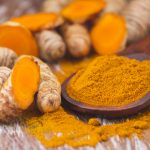Lower the risk of fatty liver disease with this natural plant compound
 (NaturalHealth365) Fatty liver disease – which is estimated to occur in up to 90% of all heavy drinkers – is a potentially life-threatening condition caused by the abnormal build-up of fat in the liver. Keep in mind that alcohol is not the only reason for fatty liver disease. And we have written extensively about the rise of nonalcoholic fatty liver disease (NAFLD).
(NaturalHealth365) Fatty liver disease – which is estimated to occur in up to 90% of all heavy drinkers – is a potentially life-threatening condition caused by the abnormal build-up of fat in the liver. Keep in mind that alcohol is not the only reason for fatty liver disease. And we have written extensively about the rise of nonalcoholic fatty liver disease (NAFLD).
But, generally speaking, complications of liver disease include abnormal fluid build-up, abnormal bleeding, and liver failure (cirrhosis).
Steps for reducing a build-up of liver fat include exercise and proper weight loss strategies, like eliminating the consumption of excess (simple) sugars in the diet. However, research offers a promising natural compound that could help people reclaim their health. (Keep reading for details.)
Worried about liver disease? Curcumin offers amazing health benefits
The liver is one of the major detoxifying organs in your body. It metabolizes drugs and acts as a filter for the blood that comes from the digestive tract, thereby “cleaning up” the blood before it passes on to the rest of your body. And it turns out that your liver also really likes curcumin!
The authors of a 2024 study published in Phytomedicine conducted a comprehensive analysis of curcumin’s effects on nonalcoholic fatty liver disease using bibliometric analysis and literature review. The researchers found that curcumin can alleviate NAFLD through multiple mechanisms, including activating signaling pathways to inhibit oxidative stress and apoptosis and potentially regulating gut microbiota.
In another study, researchers from the Natural Health Research Institute randomized 87 people with NAFLD into one of two groups. One group received a twice-daily curcumin supplement (for a total of 1,100 milligrams per day), and the other group received a twice-daily placebo. After 8 weeks, the researchers discovered some amazing effects:
- The group receiving the curcumin supplement had better-functioning livers, as measured by blood serum levels of liver (hepatic) enzymes.
- The group receiving curcumin had lower body mass index (BMI) and smaller weight circumferences. This is a huge finding (no pun intended) since obesity is a major risk factor for NAFLD.
- While more than a quarter of the patients in the placebo group had increased levels of liver fat, less than 5% of the people receiving curcumin experienced this problem.
- Lastly, compared to the placebo group, people receiving daily curcumin supplementation had significantly improved liver blood flow, liver vein diameter, and liver volume.
This is all promising news for people struggling with chronic disease of the liver. But the good news doesn’t stop there.
Curcumin is a potent antioxidant and anti-inflammatory that has also been shown to improve brain health by boosting levels of brain-derived neurotrophic factor (aka “fertilizer for the brain”), lowering the risk of heart disease and cancer, easing arthritis, plus many other health benefits.
Wondering how to get more curcumin in your diet? Check out these tasty tips
Curcumin – as well as the turmeric it’s found in – is a great addition to any healthy diet, and whether you’re living with NAFLD or not, it’s a good idea to consume it on a regular basis.
Want to know the best way to add more of this substance into your weekly menu? Consider the following tips:
- Consume with organic black pepper. This increases turmeric’s bioavailability and makes it easier for your body to absorb and use curcumin and other healthy compounds in the spice.
- Avoid heating. Heating curcumin-containing turmeric may damage its health benefits. Instead, sprinkle this spice at the end of your cooking to maximize its taste and potency.
- What are the best foods to pair it with? Try (organic) hard-boiled eggs, frittatas, pasture raised roasted chicken, wild fish, or sweet potatoes!
- Take a high-quality supplement. As mentioned, the liver fat research study participants took 1,100 milligrams per day. It’s generally thought that you need around 500 to 1,100 mg for optimal anti-inflammatory effects. As a reference point, there are about 200 mg of curcumin in one teaspoon of fresh or ground turmeric (give or take, depending on the quality of your product).
As always, check with your holistic physician before adding supplements (even herbs) to your routine. But in the meantime … feel free to get creative with curcumin and turmeric in the kitchen!
Editor’s note: For the best liver health supplement, order LiverLuv by LuvByNature today and to discover the best ways to avoid the threat of liver disease, own the Fatty Liver Docu-Class created by NaturalHealth365 Programs.
Sources for this article include:



